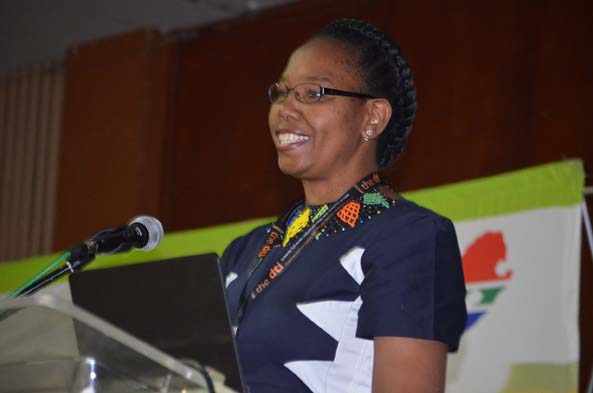Innovation interventions slow in translating into Socio-Economic Benefits |
| 2019-03-06 |
| The Chief Director of Innovation and Technology at the Department of Trade and Industry (the dti), Ms Nonkululeko Shinga says that the reviews indicate that innovation has not been translated into socio-economic benefits and the government funding instruments are inaccessible to the innovators in rural and township communities. Shinga said this during the opening of the two-day Grassroots Innovation Workshop which took place in Limpopo.
“It is as a direct response to this imbalance that we have resolved to roll-out this series of Grassroots Innovation Workshops to counter this and to address issues of knowledge production, which are limited to urban areas, in universities and in research institutions only,” she said. She asserted that innovation was not only about hi-technology implements, that it did not only occur in urban settings and that it did not only take place in state-of-the-art laboratories. “Innovation is all around and has been practiced since time immemorial. It has no colour, no gender, no age, no status. It takes place in our homes, in our garages and in the most far-flung of our rural areas. That is the reason we have brought this workshop here in your province, because we believe that knowledge production should be allowed to flourish, irrespective of where it originates from. It is important that innovation taking place in rural areas is taken seriously and that it is made sustainable. We will strive to develop systems that best respond to how we can empower grassroots innovators,” said Shinga. She added that the hosting of Grassroots Innovation Workshops was an attempt to open up and democratise innovation systems to stimulate inclusive growth and economic transformation. The Deputy Director-General of the Limpopo Department of Economic Development, Environment and Tourism (LEDET), Mr Matodzi Rathumbu pointed out the importance of supporting rural inventors to safeguard their inventions. “Our province is endowed with the most brilliant creative minds in the country, but our shortcomings are that we’re not doing enough to safeguard and document these inventions for sustainable economic purposes. It is imperative going forward that we support our innovators trademark and intellectually secure their innovations so they can enjoy their fruits of their brilliance,” he said. Grassroots Innovation Workshops will be rolled out to at least four rural provinces, with Limpopo already serving as a launch pad for the campaign. It is anticipated that these workshops will unearth technologies from underdeveloped communities, they will create networking platforms for technology development and commercialisation and focused technology development and innovative thinking at grassroots levels.
ENQUIRIES |
MENUMENU
- Know the dtic
- Media Room
- Financial Assistance
-
-
- INCENTIVES
- 12I Tax Allowance Incentive
- Agro Processing Support Scheme (APSS)
- Aerospace Industry Support Initiative (AISI)
- Aquaculture Development and Enhancement Programme (ADEP)
- Automotive Investment Scheme (AIS)
- Black Industrialists Scheme (BIS)
- Capital Projects Feasibility Programme (CPFP)
- Critical Infrastructure Programme (CIP)
- Clothing, Textiles, Footwear and Leather Growth Programme (CTFLGP)
- Export Marketing and Investment Assistance (EMIA)
- Film Incentive
- INCENTIVES
-
- INCENTIVES
- Global Business Service (GBS)
- Innovation and Technology Funding instruments
- Manufacturing Competitiveness Enhancement Programme (MCEP)
- Production Incentive (PI)
- Manufacturing Support Programme (MSP)
- Sector Specific Assistance Scheme (SSAS)
- Strategic Partnership Programme (SPP)
- Support Programme for Industrial Innovation (SPII)
- Technology and Human Resource for Industry Programme (THRIP)
- Workplace Challenge Programme (WPC)
- Khoebo Innovation Promotion Programme (KIPP)
- INCENTIVES
-
-
- Sectors and Service
- Sectors
- B-BBEE
- Special Economic Zones
- Industrial Development
- Trade and Export
- Legislation and Business Regulation
- Bills and Acts
- Statutory Committees
- National Liquor Authority
- Proposed prohibition of the use of certain EU names
- Institutional Support for Business
- South African Council for Space Affairs
- InvestSA
- Non-Proliferation
- The South African Council For Space Affairs
- Procurement and Tenders
- Research and Statistics


